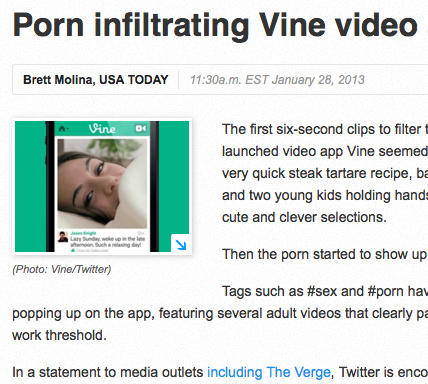The Twitter app Vine offered journalists (professional and citizen alike) a tool for sharing six-second video clips on their feeds. In early demos, Vine CEOs and eager journalists practiced by showing six seconds of the process of making steak tartare and throwing away their coffee cups. But overwhelmingly, users have taken to Vine to post porn on Twitter, according to USA Today.
Tags like #sex and #porn began appearing on the app, and The Verge reported that one porn clip somehow made it as one of Twitter’s Editor’s Picks. (The clip was removed, labeled as a “human error.”)
ALSO SEE: Apple has a porn problem, and it’s about to get worse
As we know, the tools becoming available for citizen journalism are only expanding. While it seems easy to discount Vine for its early rush of X-rated content, perhaps it’s better to say “So what?” After all, journalism will be journalism, and porn will be porn (except if it becomes an Editor’s Pick).
For its part, Twitter released this statement in response:
Users can report videos as inappropriate within the product if they believe the content to be sensitive or inappropriate (e.g. nudity, violence, or medical procedures). Videos that have been reported as inappropriate have a warning message that a viewer must click through before viewing the video.
Uploaded videos that are reported and determined to violate our guidelines will be removed from the site, and the user that posted the video may be terminated.










